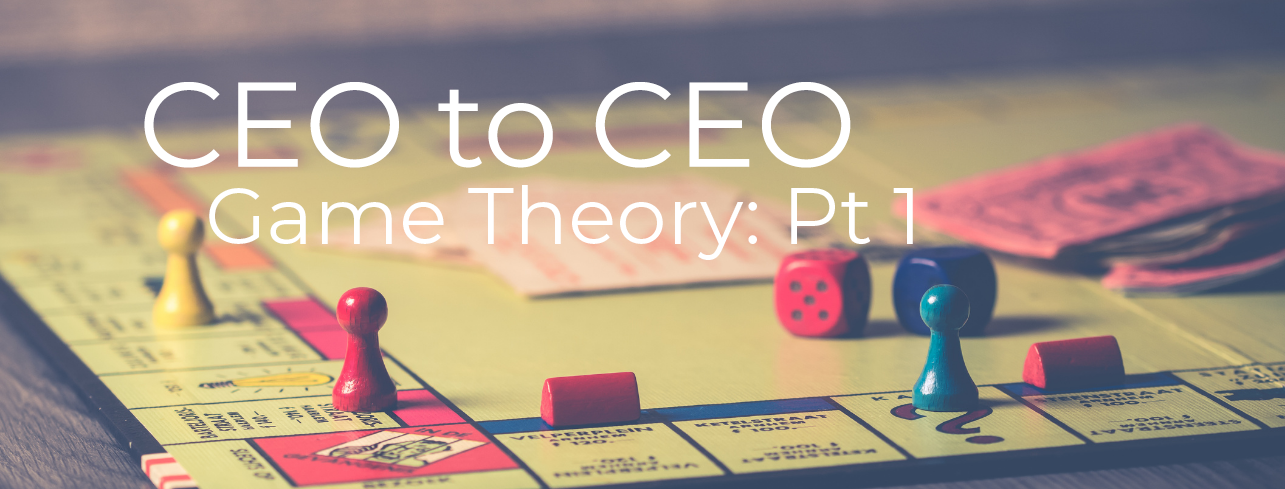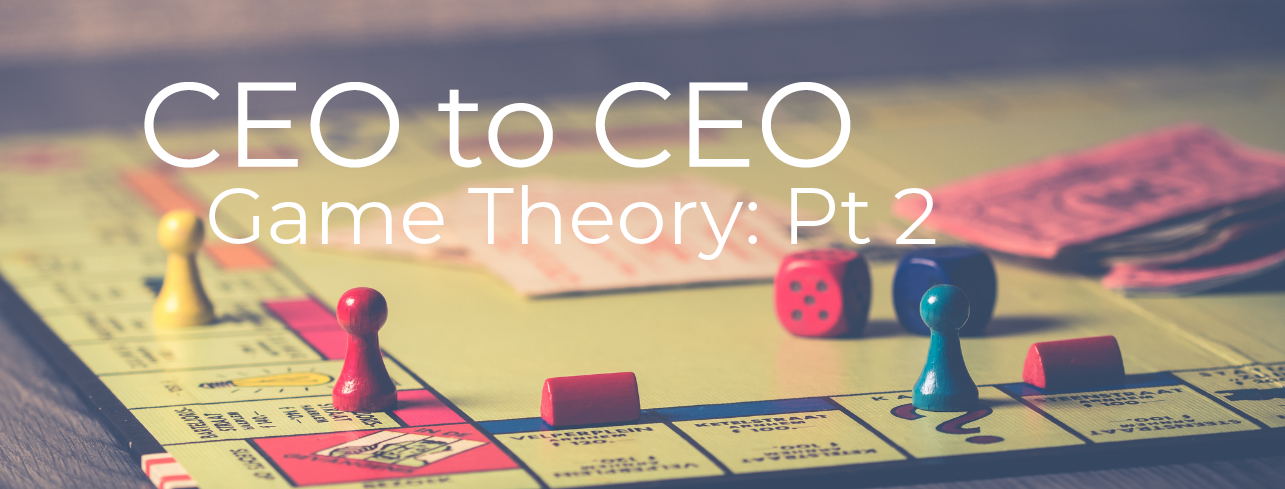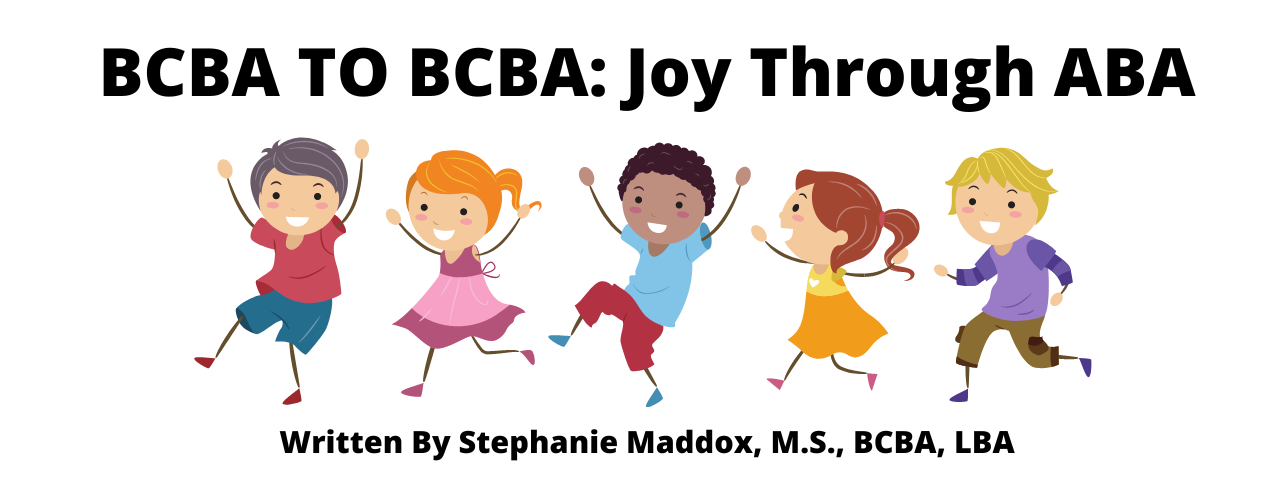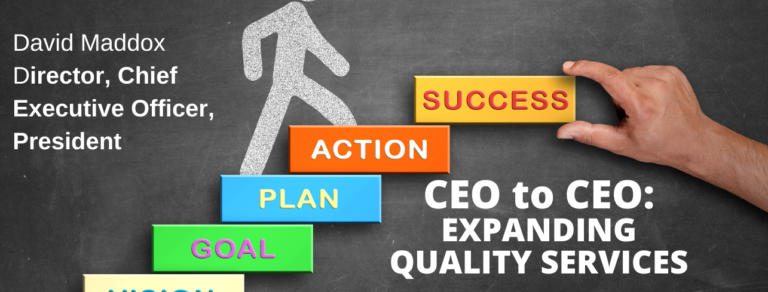CEO to CEO: Game Theory Pt. 1
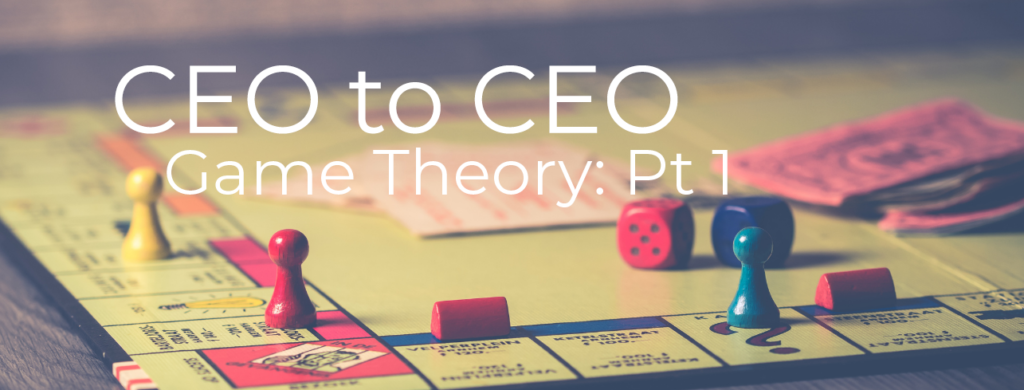
CEO to CEO: Game Theory
If you grew up enjoying competitive sports, cards, chess, puzzles, or any other strategic exercise, you are ahead of the game when it comes to blossoming as a CEO.
Like every game, your business involves primary- and secondary objectives. Like every game, success in business requires competitive competence—abilities to quickly and accurately evaluate risk and opportunity, set goals, prioritize tasks, efficiently allocate resources, and (this is a big one) relate likably to fellow players sufficient that they want to play with you again.
Yes, business is a game. Relationships are a game. I don’t mean to imply that career and relational pursuits aren’t serious. Sure they are! But “playing well with others” involves NOT taking ourselves, or our own personal agendas, too seriously.
Who was the friend growing up you always wanted on your team? Sure, you likely wanted the best player; but the best players’ affection for excellence tends to spill beyond personal competence to the value and pleasure of teamwork. He/she didn’t just play well, but inspired others to both play well and enjoy the whole event together.
For some, games are only about fun. They may pick up useful techniques, and natural talent may afford them a degree of ability that makes for passable performance among other casual players. But they don’t deeply study the game or devote themselves to mastery.
Those who want something beyond casual fun, who want something more akin to professional success, must: (1) become diligent students of the game, (2) access excellent guidance from those who have already spent decades developing relevant expertise, and (3) devote thousands of hours practicing the fundamentals necessary to achieve thorough, seasoned, balanced mastery of knowledge, skill, and application.
Perceiving business as a game keeps you fresh. Having fun guards against burnout. Rolling with the ups and downs of wins and losses as you learn and grow makes you nimble and develops endurance. Navigating minutiae as you corral resources, steadily making your way toward your big-picture goals, deepens your capacity to attract teammates and provide them with a measure of the wisdom and guidance they need to become great players themselves.
Applying Game Theory begins with recognizing the “game” aspect of whatever situation you face—whether within the context of a relationship, a meeting, a negotiation, entering a market, offering a product or service, or having coffee with someone. “Seeing life as a game” is about staying open to discovery, enjoying curiosity, celebrating creativity, and keeping it fun.
Think of “game” as a word that describes the process by which any tactic(s) or strategy is executed toward the achievement of any goal, whether large or small. Yes, “making a game” of an otherwise monotonous or unpleasant task is a useful technique for maintaining our own morale, but that’s only the beginning. Curiosity, creativity, and even revolutionary ideas, spring from playfully thinking outside the box.
Think of how good humor often dominates the presentation and demonstrates the genius of profoundly successful people—Albert Einstein, Warren Buffet, and Elon Musk, come to my mind. These guys’ thoughts, perspectives, and lives epitomize playfulness. Their productivity is world-changing, but their demeanors are anything but hurried, anxious, or overworked. They exemplify fun within the context of life and purpose.
Game Theory as a subject fills many delightfully interesting books. This piece barely touches on its most basic principles. I happily encourage readers to explore Game Theory by way of deliberate research, discussion and experimentation. We can take a look at a couple of trees here, but my primary hope is to help the reader to recognize the forest.
Individual Game Theory principles can help you predict the behavior of other players and outcomes of specific endeavors. Much Game Theory involves negotiations.
For example, if you understand that a negotiation is like a dance—that it reflects a complex exchange between at least two parties, is related to “the music” which flavors the mood and setting, and should not end prematurely but rather on cue—you will both come to better enjoy the negotiation process and learn to help your counterparts do the same. Even if you know all the steps and could skip to the end with ease, the other fellow might be less certain and need time to feel his way through. Smile. Don’t hurry. Let the song finish. Let the tempo walk you around the floor.
Another Game Theory principle tells us that “negotiations invariably favor the party who is most patient.” Knowing this truth helps the wise negotiator to identify what aspects are urgent and which are not…for each party. From there she can win the leverage game by taking quick action to reduce short-term exposure and positioning herself for the long game with time on her side.
But most negotiations are not purely “zero-sum games,” as is the case when a transaction narrows itself down to which side is going to cave on a key point.
Great negotiators are ever-mindful of how to cultivate win-win exchanges. To that end, they ask questions and then listen. They are looking for potentially unseen ways to unlock value through interaction between the parties—possibly much more value than any participant might have originally hoped. They know that a person is worth much more than the trinket in his hand for which they hope to trade.
So if the “trees” are principles like “win-win,” what is the “forest”? And how does all this apply to building an ABA practice?
The “forest” is the big picture—understanding that life is a game. And business, in particular, is not only a game or sport—it’s a team sport. It’s all about relationships and caring about people.
Building an ABA practice? Learn the fundamentals. Know your industry. Develop relationships with the best players—not just on your team, but on the best teams you can find. Enjoy the process. Take note of what works for them and why. Get to know your employees and associates. Develop an understanding of how different personality types are motivated differently. Every item on this list is a game that continues as long as you keep playing.
As a CEO you are the visionary. You are the architect. As you cultivate your creative skills, use them to help others around you to build their vision and plans for their hopes and dreams as you simultaneously do the same for yourself. Identify and build together on common ground so that your collaboration is for your mutual benefit. Do that well, people will want to stay with you for life.
And isn’t that fun?





